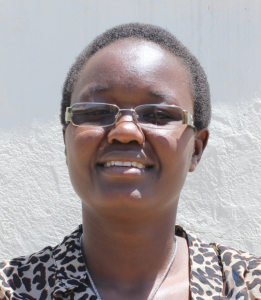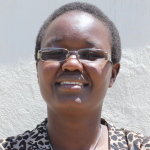Daisy Special School, a school for handicapped students, has 437 students and 28 teachers that face each day without sufficient water.
Currently, the school depends on the water they can collect from a stand pipe in the community, but the water is unreliable. The tap only provides water two days a week, four hours each day, and is shared with the community. There is never enough to meet the needs of the school, especially with the extra challenges presented.

Since the school is a residential school for handicapped students, they need running water all of the time. Without it, they cannot maintain students' personal hygiene or the general hygiene around the school.
"As a teacher, a lack of water is as good as closing the school. This is because we have children with special needs, and when there is no water, it means they are being exposed to sicknesses. I am affected psychologically because when I see them suffering because of lack of water, it's hard to keep them in school," said head teacher James Okoko, standing near the tap below.

There are also rainwater collection tanks on the school campus, but they don't hold enough water, and during the dry season, they sit empty and useless.
Some of the school's students are incontinent, so they need to be bathed anytime they are changed and have their bedding washed and changed daily, but without water, it is impossible. Students suffer as a result, and it makes the learning environment for other students uncomfortable.
"Lack of water in school affects us a lot because when the toilets are not washed, we cannot use them. When the hostels and the bedding are dirty, we cannot sleep. When those using diapers don't get a good shower, we can't stay in class. This affects us because we cannot learn unless there is water flowing all the time," said 12-year-old student Shaleen A. (shown below).

The burden of collecting sufficient water needed for drinking and cooking, bathing, flushing toilets, cleaning, and washing clothing and bedding falls on the students not in wheelchairs. It is a heavy burden, and they often find themselves waiting in long lines that keep them out of class.
Everyone deserves dignity and access to clean water. With a borehole on the school campus, water can be available throughout the year, which will enable the teachers and school administration to take excellent care of the children in their care, especially those struggling to stay clean. Accessible water will also allow all of the students to get back to learning.
What We Can Do:
New Well
We conducted a hydrogeological survey at this school and the results indicated the water table beneath it is an ideal candidate for a borehole well. Due to a borehole well's unique ability to tap into a safe, year-round water column, it will be poised to serve all of the water needs for this school's large population, even through the dry months.
The school will help collect the needed construction materials such as sand, rocks, and water for mixing cement. They will also provide housing and meals for the work team, in addition to providing local laborers. We will complement their materials by providing an expert team of artisans and drilling professionals, tools, hardware, and the hand-pump. Once finished, water from the well will then be used by the school’s students and staff for drinking, handwashing, cooking, cleaning, and much more.
Handwashing Stations
The student health club will oversee the two new handwashing stations we will provide, and make sure they are kept clean and in working condition. The club leaders will fill the handwashing stations with water daily and make sure they are always supplied with a cleaning agent such as soap or ash.
VIP Latrines
We will construct two triple-door latrine blocks using local materials that the school will help gather. Three doors will serve the girls and three doors will serve the boys. All of these new latrines will have cement floors that are designed to be easy to use and to clean. And with a borehole right on school property, there should be enough water to keep them clean.
Training on Health, Hygiene, COVID-19, and More
We will hold a one-day intensive training session with students, teachers, and parents. This training will cover a wide range of topics including COVID-19 symptoms, transmission routes, and prevention; personal and environmental hygiene; and the operation and maintenance of the borehole, latrines, and handwashing stations. There will be a special emphasis on handwashing.
Our team of facilitators will use a variety of methods to train, including participatory hygiene and sanitation transformation, and asset-based community development. We will initiate a student health club, which will prepare students to lead other pupils into healthy habits at school and at home. We will also lead lectures, group discussions, and provide illustrative handouts to teach health topics and ways to promote good hygiene practices within the school including handwashing and water treatment. We will then conduct a series of follow-up trainings before transitioning to our regularly scheduled support visits throughout the year.
We and the school strongly believe that all of these components will work together to improve standards at this school, which will help lead to better student academic performance and will help unlock the opportunity for these students to live better, healthier lives.




 Borehole Well and Hand Pump
Borehole Well and Hand Pump
 Rehabilitation Project
Rehabilitation Project

















 After water treatment, we constructed a cement well pad to seal off the well from any ground-level contaminants. Tiles are installed beneath the spout to protect the cement from the erosive force of the water.
After water treatment, we constructed a cement well pad to seal off the well from any ground-level contaminants. Tiles are installed beneath the spout to protect the cement from the erosive force of the water.














